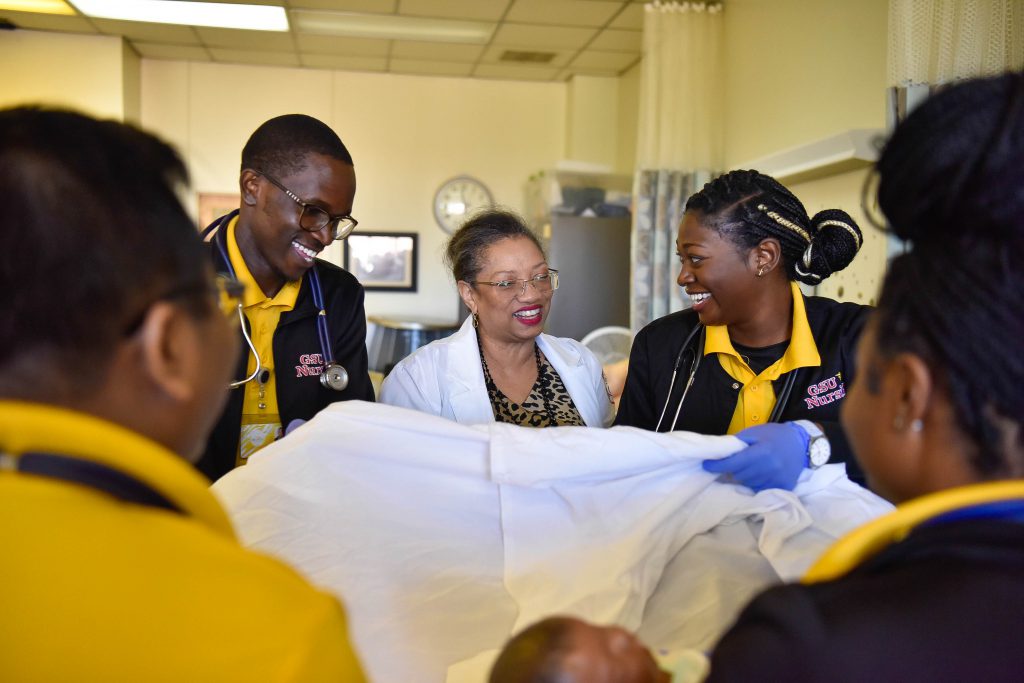Nursing graduates continue 100% NCLEX pass rate for third consecutive year

A winning trifecta can often pay off in big dividends, and that’s something Grambling State University’s School of Nursing and College of Professional Studies is banking on.
For a third consecutive year, 100% of new nursing graduates — 13 in total — passed the National Council Licensure Examination (NCLEX), a nationwide examination for the licensing of nurses in the United States.
“I think the fact our graduates have had a 100% passing rate for three straight years now says a lot,” said Assistant Professor Dr. Ashley Pierre. “I think it speaks to the faculty and staff here, but I also think it speaks to the resilience of Grambling as a whole. We did have a program at one point that unfortunately was closed in 2014. And then under the leadership of Dr. Meg Brown, our Associate Dean (in the College of Professional Studies) and President (Rick) Gallot at the time, the program reopened in 2015 with our first cohort that graduated in 2018.
“And I think that just speaks to the resilience of our rebuilding — starting over — and continuing to attract so many people to Grambling. I’m originally from California and I came all the way to Grambling just to attend the nursing program, and it spoke to me back then. I’m a 2009 Grambling graduate. So, I think it speaks to resilience and our ability to rebuild and again be successful with this new program in this new era.”
Pierre said leadership is a key part of the recent success of Grambling’s nursing program.
“Not only President Gallot before, but our new president, Dr. Martin Lemelle, has been amazing to help keep the school of nursing growing,” Pierre said.
Dr. Meg Brown, Professor and Associate Dean of the School of Nursing said the recent success validates the program of study throughout the United States as well as internationally.
“The BSN program was accredited by the CCNE (Commission on Collegiate Nursing Education) in January of 2021,” Brown said. “The first class graduated from an accredited program in May 2021. Full state approval was granted by LSBN (Louisiana State Board of Nursing) in 2022.
“There were barriers to starting a new program with GSU seemingly down for the count with little hope of having a BSN program. The goal was to be like the phoenix rising from the ashes. The faculty and staff are grateful for the support from GSU’s leadership, ULS, Louisiana Board of Regents, the community, and the members of GramFam.”
Of the recent 13 nursing graduates who all passed the NCLEX on their first attempt, five were international students — one of the five was male, and the remaining eight were Black females.
“Two of the eight were outside of Louisiana — California and Mississippi,” Brown said. “Three of the international students were from Africa and two from the Islands. The faculty adjusted teaching methods as needed for the different learning styles.”
Pierre said it’s no secret that the nursing field continues to face a shortage here in 2024.
“Nurses are needed immensely right now,” Pierre said. “It’s a very important field. When I was in school there was a nursing shortage that there was a movement to get out of by 2020. But now it’s 2024 and there’s still a nursing shortage.
“I think COVID showed a lot of things that needed to be taken care of. In the hospitals, I think it showed a lot of both green flags and red flags. I think it exposed how much nurses are needed. I think it exposed that there’s not enough nurses available.”
Pierre said digging deeper, the ongoing shortage also shows a shortage of faculty available to teach nursing students.
“We have to have a certain amount of faculty to enroll a certain number of students,” Pierre said. “If we don’t have that, then we’re unable to admit bigger classes due to the nursing faculty shortage. I think that’s also something that has to be looked into.”
Pierre also said the nursing shortage might affect minority communities even more than others.
“At Grambling we’re striving to produce the best and put out the best because there is such a shortage,” Pierre said. “And I think that for an HBCU, it’s very important because there’s such a high disparity in minority communities who are sick. So, I think putting our students from an HBCU does help kind of decrease that health disparity that is really, really seen in the minority community.”
To learn more about the program, visit gram.edu/nursing.

